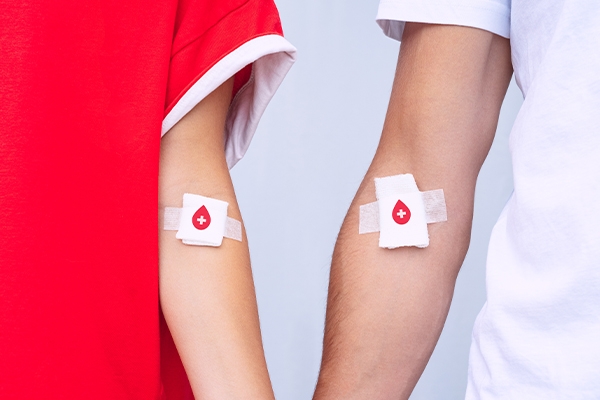The Abundant Benefits of Blood Donation

Do you know Scream? This American horror film just released its 6th series this year, entitled Scream VI. Unfollowing the well-known franchise's big name, Neve Campbell, the main actress of the 1st and 2nd films, decided to not return in this series. Campbell, who is now busy campaigning with the American Red Cross to encourage more people to donate blood, feels she has done enough to enjoy the bloodshed in Screams.
"The offer made to me was incomparable to the value I bring to this franchise," Campbell said. In a brief campaign, she also stated, "Approximately 50% of Americans enjoy watching bloodshed in horror films. However, only 3% are willing to pay off their debts." Campbell wishes there were more blood donors in America.
What about Indonesia? According to the Indonesian Ministry of Health's Mediakom, PMI (the Indonesian Red Cross) has met 85% of the national blood need in 2021. Even so, the demand for blood will continue to rise.
Learn about blood donors

Many questions arise when the phrase "blood donor" is used, including the following:
- Who can donate blood?
Anyone aged 17 and who is physically fit and weighs at least 50 kg.
- Are blood donations painful?
Despite the fact that the needle is larger than a standard syringe, it does not hurt as much as we imagine. When the needle is first inserted, it feels like a minor sting. Blood discharge will not be felt in the proper position.
- How long and how much blood is required?
Blood collection takes about 10-15 minutes. The entire procedure takes 45 to 90 minutes. Normally, only one pint of blood is taken (equivalent to 473 ml).
- Is there a risk of contracting a disease while donating?
No. Before use, all equipment is sterilized and packed. In addition, the equipment is only used once.
- What should be prepared?
Consume plenty of water. Consume iron-rich foods. Avoid eating fatty foods. Don't donate blood with an empty stomach.
The blood donor effect

Donating blood is morally admirable. A pint of blood can save several lives. Nonetheless, not everyone is eager to participate.
The reason for this could be that blood donation raises the following:
- Bruises. It happens because the needle punctures blood vessels for a long time. Bruising usually occurs around the site of the puncture. To treat this, apply a cold compress to the bruised area for a few minutes.
- Bleeding. Officers typically bandage the puncture site. Then you'll be asked to hold it for a few minutes until the wound heals. If the bleeding continues, raise your arm for 3-5 minutes above your heart. Call your doctor if it doesn't stop.
- Dizziness, lightheadedness, and nausea. These three things are side effects of blood donation. This is why officers usually provide nutritious food or drinks after taking blood. Utilize your downtime by consuming these foods and beverages.
- Painful. It would be a lie to say that blood donation isn't painful. At the very least, you will be uncomfortable while the needle penetrates your skin and blood vessels. If you feel any pain, take the pain reliever recommended by the officer.
- Weak. This is also a side effect of blood donation. Because of this possibility, the officer usually advises you to avoid strenuous physical activity after the donation. Rest is necessary for recharging.
Are you afraid to donate blood? Maybe you haven't heard about the incredible benefits behind this heroic act.
The benefits of donating blood

Blood donation benefits both the recipients and the donors. Especially if it is done on a regular basis. According to the Armed Services Blood Program (ASBP), men can donate blood every two months, and women can donate blood every three months.
Here are some of the benefits of blood donation for donors:
1. Detecting diseases for free
Blood donation is usually free. Before blood is drawn, potential donors must go through a series of tests, including a blood test. This test can detect serious illnesses such as HIV/AIDS, syphilis, hepatitis B, hepatitis C, and malaria. If there is a serious illness, we can take immediate action.
2. Reducing the likelihood of cardiovascular disease
Thick blood is one of the causes of heart and blood vessel disease. Regular blood donations will reduce blood viscosity. Allow blood to circulate freely throughout the body.
3. Aid in weight loss
Adults burn 650 calories while donating one pint of blood. Regular blood donation greatly aids the mission of losing weight.
4. Increasing blood production
Losing a large amount of blood without sustaining serious injury causes the body to produce new blood cells. New blood cells can circulate oxygen and nutrients more efficiently throughout the body.
5. Mental health aids
Giving blood is the same as helping others. This altruistic attitude can improve mental health in a variety of ways, including making someone happy, increasing attachment between people, and triggering a desire to help even more.
Is your interest in donating blood on a regular basis growing? If so, congratulations! You can donate blood at PMI (the Indonesian Red Cross), blood donor units, or public places that host blood donation events.
A drop of blood, like PMI's tagline "We're Healthy, They're Safe," truly means a lot. Not only do they save lives, but they also calm the soul. Let's donate blood!
If you have any questions related to blood donation, click on WhatsApp.



